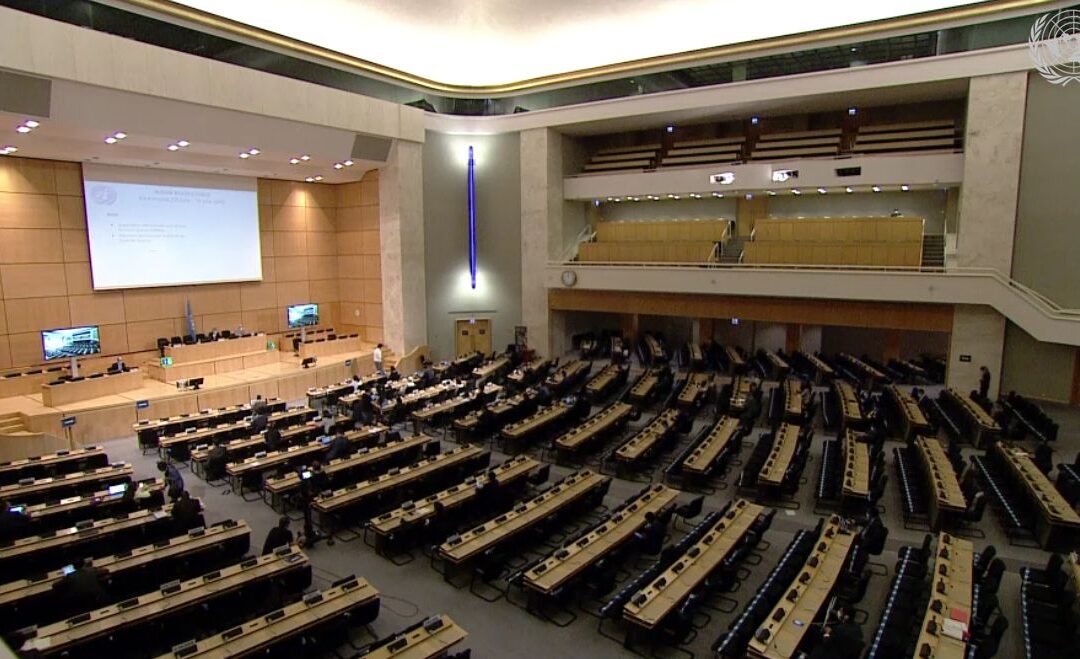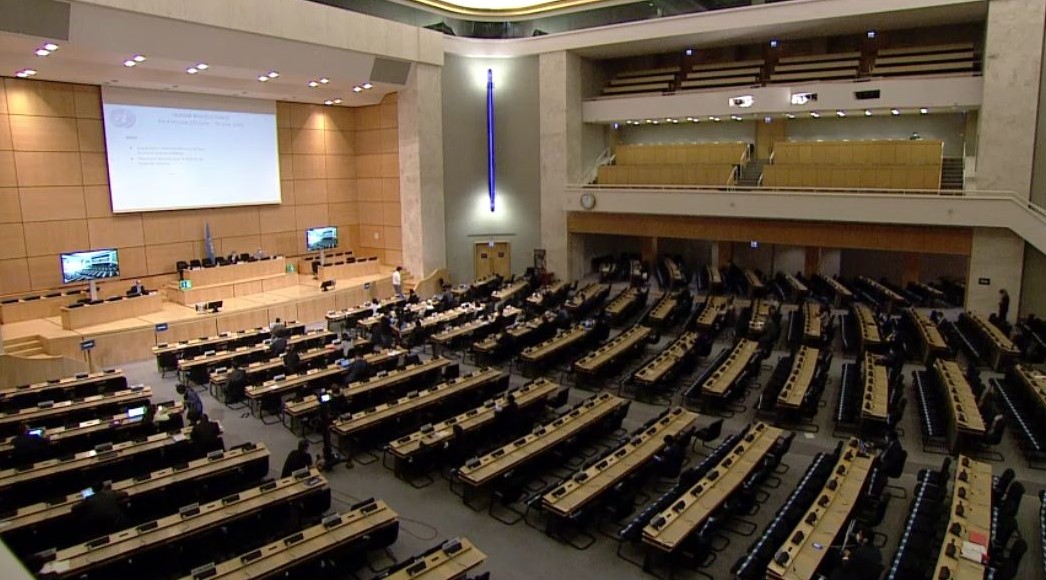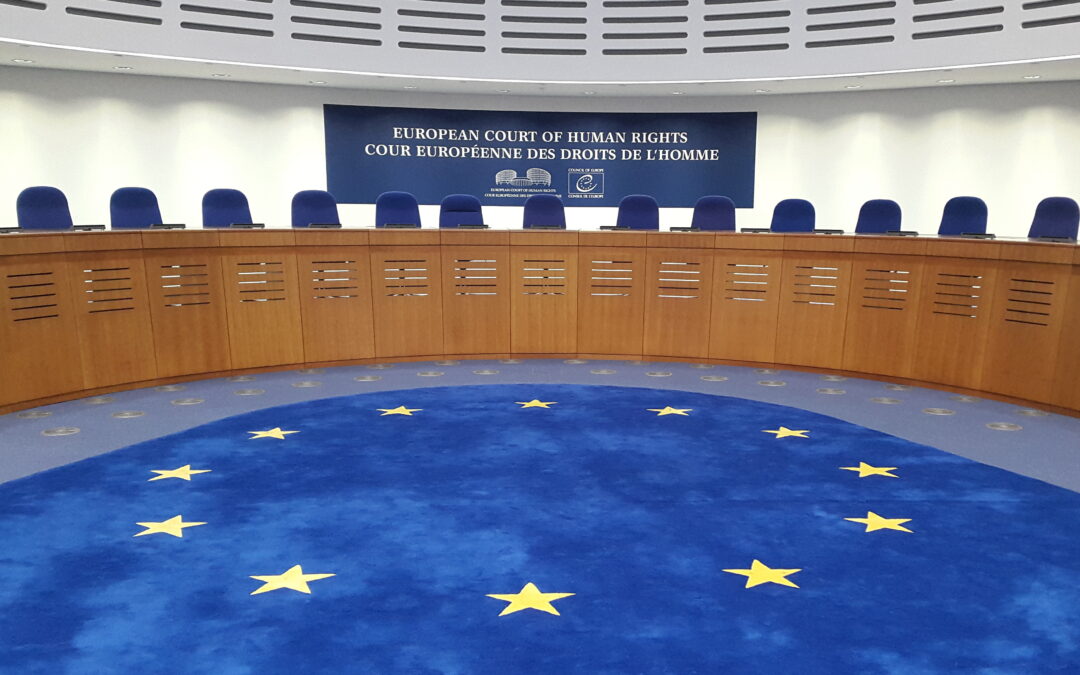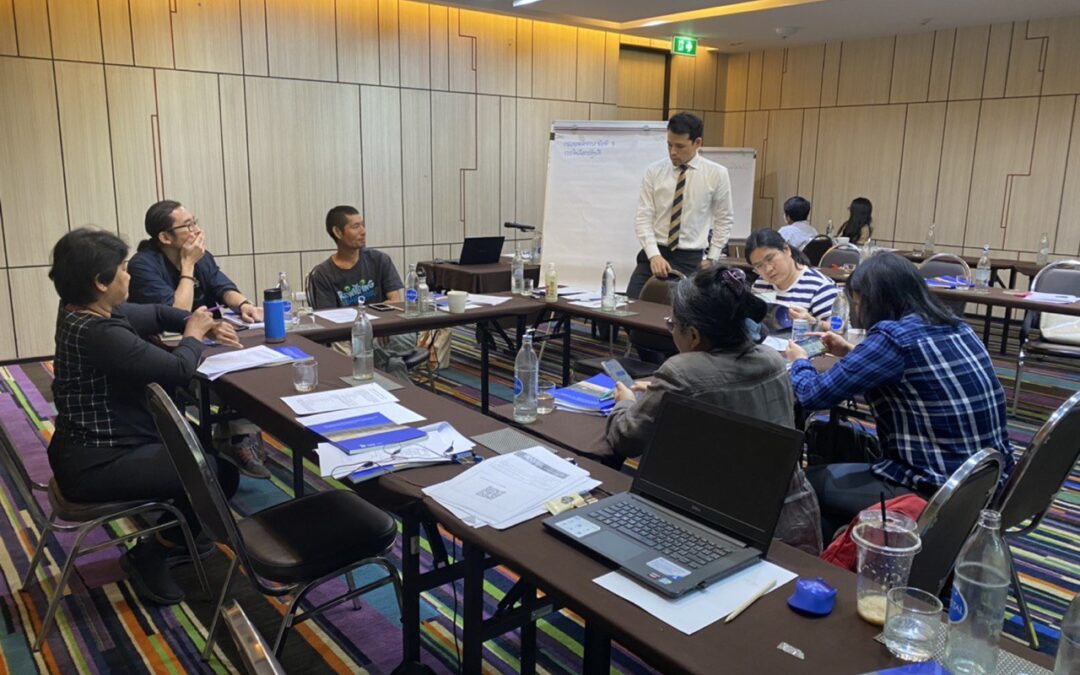
Sep 18, 2020 | Advocacy, Non-legal submissions
At a special session of the UN Human Rights Council in Geneva, the ICJ and IBAHRI have called on Belarus to comply with its international human rights obligations, including by releasing those arbitrarily detained and ceasing abusive prosecutions as well as harassment of lawyers.
The oral statement read as follows:
“Madame President,
The International Commission of Jurists (ICJ) and the International Bar Association’s Human Rights Institute (IBAHRI) are concerned at the continuing human rights violations in Belarus following the Presidential election. Widespread arbitrary arrests, police violence against peaceful protesters, torture and other ill-treatment of detainees and allegations of enforced disappearances, violate Belarus’s international law obligations, and require accountability.
Our organizations are particularly concerned about reports that these violations are accompanied by widespread denial of detainees’ access to a lawyer. Lawyers face harassment and obstacles in carrying out their professional duties.
We highlight the recent arrests and detention of two prominent lawyers, Ilya Salei and Maxim Znak, on politically motivated charges on 9 September 2020. According to official information, the lawyers are charged with the crime of “calls for actions aimed at causing harm to the national security of the Republic of Belarus”.
We urge the Council to call on Belarus to:
- comply with its international human rights obligations, including by releasing those arbitrarily detained and ceasing abusive prosecutions;
- provide detainees with confidential access to lawyers of their choice;
- end harassment of lawyers and ensure accountability and reparations for those whose human rights have been violated; and
- request OHCHR to monitor and report to the Human Rights Council on the human rights situations in Belarus.
Thank you”

Sep 17, 2020 | Advocacy, Non-legal submissions
At the Human Rights Council, the ICJ highlighted deepening impunity for gross human rights violations in Sri Lanka, and the need for a UN investigative mechanism.
The oral statement was made in the interactive dialogue with the UN Special Rapporteur on the promotion of truth, justice, reparation and guarantees of non-recurrence, at which the current Rapporteur presented the report of his predecessor, Pablo de Greiff, on a visit to Sri Lanka in 2017.
The statement read as follows:
“The ICJ welcomes this opportunity to discuss the report of your predecessor’s 2017 visit to Sri Lanka.
We share the report’s assessment that “none of the constituent elements of a transitional justice policy are fully in place.” Indeed, the situation has only further deteriorated since 2017, further entrenching the denial of justice to victims.
Sri Lankan courts remain unable and unwilling to address the impunity of security forces for crimes under international law. We echo the report’s observation ‘in its current state, the criminal justice system in Sri Lanka is inadequate and flawed’.
This will only worsen if the proposed 20th Amendment to the Constitution is passed. The President, himself credibly accused of war crimes and crimes against humanity during his tenure as Defence Secretary from 2005-2015, would have unilateral power to appoint the judges of the superior courts, the Judicial Service Commission, Attorney General and the Inspector General of Police. This would further undermine any independence and impartiality in the already institutionally weakened judiciary.
Given the abject failure of Sri Lanka to implement a credible accountability mechanism, and its ongoing betrayal of the rule of law, the ICJ calls on the Council to establish an international accountability mechanism, and we urge you Mr Special Rapporteur to closely monitor and analyze the country situation in coordination with other mandate holders.
Thank you”

Sep 15, 2020 | Advocacy, Non-legal submissions
At the UN Human Rights Council in Geneva, the ICJ has urged States to ensure human rights and avoid discriminatory impacts, and for businesses to respect their human rights responsibilities, in responding to the COVID-19 pandemic.
The oral statement, delivered in a general debate on the update of the High Commissioner for Human Rights, read as follows:
“In our latest report, Living Like People Who Die Slowly: The Need for Right to Health Compliant COVID-19 Responses,[1] the International Commission of Jurists (ICJ) calls on States to ensure that their individual and collective responses to the COVID-19 pandemic comply with international human rights law, including the right to health.
Any abuse of pandemic measures to repress human rights defenders, dissenting voices, or civil society more generally, is unacceptable. Respect for freedom of expression, including the right to information, is essential to effectively addressing the pandemic.
The particularly acute impact of COVID-19 on already-marginalized people heightens the importance of equal access to health facilities, goods and services. The report documents disproportionate impacts on non-citizens, older persons, women and girls, LGBT persons, persons deprived of their liberty, persons with disabilities, sex workers and healthcare workers.
Businesses, and particularly private actors in the healthcare sector must meet their responsibility to respect human rights. This will be crucial in the development, production and distribution of any COVID-19 vaccine.
Madame President, the ICJ emphasizes the continuing importance and applicability of the 1984 Siracusa Principles on the Limitation and Derogation Provisions in the International Covenant on Civil and Political Rights,[2] and the recognition in the WHO International Health Regulations that implementing measures must be fully consistent with human rights.”
[1] https://www.icj.org/icj-new-global-report-shows-that-the-right-to-health-must-be-central-to-state-responses-to-covid-19/ (1 September 2020).
[2] https://www.icj.org/siracusa-principles-on-the-limitation-and-derogation-provisions-in-the-international-covenant-on-civil-and-political-rights/ and UN Doc E/CN.4/1985/4, Annex.
The full range of materials produced by the ICJ concerning the COVID-19 pandemic can be accessed at: https://www.icj.org/human-rights-in-the-time-of-covid-19-front-and-centre/

Sep 14, 2020 | Advocacy, Non-legal submissions
In a statement to the UN Human Rights Council in Geneva, the ICJ has welcomed the report of the Independent Investigative Mechanism for Myanmar (IIMM)
The oral statement was delivered in an interactive dialogue with the IIMM, and read as follows:
“The ICJ salutes the Mechanism in setting up the necessary infrastructure for its operation despite the challenges brought about by the COVID-19 pandemic. Given the lack of genuine and independent domestic investigation and prosecution of serious human rights violations in Myanmar, the efficient establishment of the Mechanism is welcomed.
The ICJ shares its concern over the Government of Myanmar’s lack of cooperation with the Mechanism. The ICJ recalls Myanmar’s obligation to ensure accountability for serious human rights violations occurring in Myanmar, including, but not limited to, the acts against ethnic Rohingya that were the subject of the report of the Government-appointed Independent Commission of Enquiry.
Given the Mechanism’s mandate to gather and preserve evidence of any serious human rights violations committed in Myanmar from 2011 to the present, the ICJ underscores the need to investigate the widely reported accounts of killings, serious physical injury, mass displacement and destruction of property in various parts of Rakhine and Chin states in the context of the ongoing conflict between Myanmar and the Arakan Army. The Myanmar Government still refuses to hold a ceasefire despite the onset of the COVID-19 pandemic in Rakhine. The parties to the conflict must be held accountable for any violation of international human rights and humanitarian law.
The ICJ would like to ask: how can States and inter-governmental organizations strengthen support for the mandate?”
For more information, contact: Kingsley Abbott, kingsley.abbott(a)icj.org

Sep 14, 2020 | Advocacy, Cases, Legal submissions
The ICJ and ECRE intervened today before the Grand Chamber of the European Court of Human Rights in the case of the extradition of a Kyrgyz national of Uzbek ethnicity back to his country of origin where he would be at risk of torture or other forms of ill-treatment .
In their submissions, the ICJ and the European Council on Refugees and Exiles (ECRE) analysed thenon-refoulement obligations of the Russian Federation under international human rights law in relation to the consideration of evidence to assess the substantial grounds to believe that a concerned person will face real risk of a serious human rights violation; and the use of diplomatic assurances purportedly to protect against torture and other serious human rights violations in light of international law.
The two NGOs also provided the Court with an update on the legal framework governing extraditions from the Russian Federation to Central Asian States, in particular Kyrgyzstan, as well as Russia’s extradition practice. They concluded that the analysis of the law and practice revealed a number of critical human rights deficits.
They submitted that the lack of respect for the procedural aspect of the principle of non-refoulement, the consequent ineffectiveness of domestic remedies in this regard, in the Russian Federation, and the abysmal record of Kyrgyzstan in upholding its obligation to respect and protect the prohibition of torture or other ill-treatment mean that extraditions from the Russian Federation to Kyrgyzstan entail a high risk of violations of both substantive and procedural aspects of the principle of non-refoulement.
These submissions are an update of the third party intervention submitted by the ICJ before the Chamber of the European Court of Human Rights on 22 September 2016. The Chamber had ruled that no risk of breach of the principle of non-refoulement existed in the case but the judgment is now subject to the review of the Grand Chamber.
ECtHR-TK and others v Russia-GC-ICJECRE-Final (download the third party intervention)

Sep 14, 2020 | Advocacy, News
On 13 September 2020 the ICJ hosted a workshop on the impacts on economic, social and cultural rights associated with the development of Special Economic Zones (SEZs) in Thailand. Lawyers, members of civil society organizations and academics from across Thailand attended the Workshop.
The event began with an introduction to ICJ’s report – the Human Rights Consequences of the Eastern Economic Corridor and Special Economic Zones in Thailand – and outlined the deficiencies in the legal and regulatory framework governing economic development in Special Economic Zones and the Eastern Economic Corridor.
During the group discussions, participants were introduced to the international laws and standards that are applicable in the context of Thailand and can be applied to allegations of human rights violations and negative environmental impacts. They were urged to use these standards for their advocacy work.
These included economic, social and cultural rights contained in the International Covenant on Economic, Social and Cultural Rights (ICESCR), to which Thailand is a State party and other internationally recognized principles, including:
- Right to an adequate standard of living and housing under article 11 of the ICESCR, General Comments 4 and 7 of the Committee on Economic Social and Cultural Rights and the Basic Principles and Guidelines on Development-Based Evictions and Displacement – which stress the need to provide adequate legal protection from forced eviction, due process, alternative accommodation, and access to an effective remedy of those that are affected by eviction orders;
- Human rights obligations that are exercised in relation to the environment, such as obligation to facilitate public participation in decision making related to the environment, and duties to protect human rights defenders and to conduct the prior assessment of the possible environmental impacts of proposed projects and policies; and
- Rights to and at work under article 6 to 8 of the ICESCR, General Comment No. 19 and 23 of the Committee on the Economic, Social and Cultural Rights, and several ILO Conventions, particularly regarding rights abuses suffered by migrant, seasonal and subcontracted workers, as well as restrictions on freedom to join and form trade unions.
At the conclusion of the Workshop, participants exchanged views on strategies and collaboration for action to mitigate potential impacts of the Special Economic Zones and the Eastern Economic Corridor and to advance the protection of economic, social and cultural rights.
Further reading
Thailand: laws governing development of Eastern Economic Corridor and Special Economic Zones fail to adequately protect human rights – ICJ report
Thailand: ICJ hosts discussion on human rights consequences of Special Investment Zones
ICJ and Chiang Mai University discuss Special Economic Zones in Myanmar and Thailand










